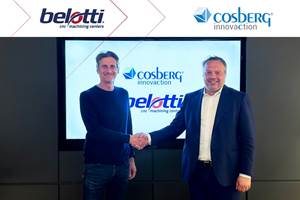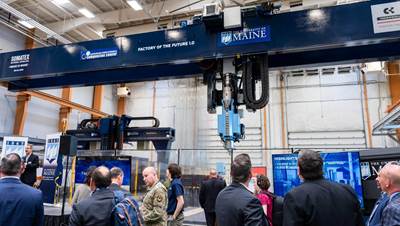Ideko research validates robotic solution for clean, precise composites machining
Designed through the European Fibremach project, the equipment provides a greater increase in precision and machining efficiency and integrates a monitoring system that ensures part quality.
Spanish research center Ideko (Elgoibar) is offering industry a cleaner and safer machining alternative to conventional milling machines or manual cut and drilling operations through the development and validation of a robotic solution. Capable of machining composite parts with high precision and with reduced investment, the equipment incorporates a patented technology by Ideko in which the workhead sucks 100% of the generated dust particles from the tool itself, preventing them from floating in the air.
“The dust produced in these processes is not only harmful to people, but also to the useful life of the machines themselves due to its abrasive and electrically conductive properties,” says Asier Barrios, Ideko’s project manager. “In the long term, this dust ends up damaging the mechanical components of the machines and can cause faults in the electronic systems, which is why it is essential for these manufacturers to have a solution with these characteristics.”
The chip and dust extraction technology is just one of the innovations developed during the project, which has resulted in a more precise and highly productive robotic cell for machining composite materials. Ideko’s four research groups have also worked on improving the precision and control of the robot machining process to better meet composites manufacturer’s needs.
For instance, Ideko has developed an artificial vision system that increases the robot’s precision, using various cameras and photogrammetric algorithms. “The developed robot, continuously and at high speed. corrects its position and orientation based on camera measurements,” Barrios explains. “This allows machining with an accuracy of between 0.1 and 0.2 millimeters over the robot’s entire working area, which improves the robot’s accuracy by a factor of four times its original capacity.”
In addition, to ensure the quality of the machined parts, a continuous vibration monitoring and control system has been developed. The vibrations generated during machining are measured and analyzed by means of sensors integrated in the robot. If excessive vibrations are detected, which can be caused by poorly clamped tools or worn tools, the robot automatically modifies its feed and rotational speed of the cutting tool to reduce vibrations and prevent damage to the workpiece.
All of the information on the status of the robot and the machining process is thus recorded in the cloud. This information can be consulted to analyze exactly how each part has been machined, and even enables the integration of AI functions that work on the data in the cloud to optimize productivity.
According to Ideko, the robotic architecture also offers the possibility of easily scaling the solution by adapting the created systems to robots of different sizes to meet the need to machine parts of varying volumes. “This will enable companies that manually mill, rechamfer and drill composite parts, to adopt a robotic solution that protects their workers and increases productivity,” says Barrios.
Fibremach, led by Ideko and aided by consortium members including Aldakin Group and Aernnova, was completed in 2023. The project was recognized by European Association of Manufacturing Technologies CECIMO, which awarded it in 2023 at the first Machine Tools Innovation Award.
Completed in 2023, Fibremach has received funding from the European Union through the Horizon 2020 program and, in addition to Ideko, the consortium has been formed, among others, by Aldakin group and Aernnova.
Related Content
CFRP planing head: 50% less mass, 1.5 times faster rotation
Novel, modular design minimizes weight for high-precision cutting tools with faster production speeds.
Read MoreFilament winding increases access to high-performance composite prostheses
Steptics industrializes production of CFRP prostheses, enabling hundreds of parts/day and 50% lower cost.
Read MoreATL Composites collaboration advances kite-foil board production for Paris Olympics
Breiana Whitehead, pioneering Australian kite-foil sailor, spearheads board design intricacies with ATL Composites to enhance her performance ahead of the July 2024 competition.
Read MoreBelotti, Cosberg partner for advanced automated assembly solutions
The Italy-based companies merge technological know-how to develop novel systems for the processing and assembly of light alloys and carbon fiber components.
Read MoreRead Next
TPI, UMaine, ORNL to leverage world’s largest polymer 3D printer for wind turbine tooling
Ingersoll Masterprint LFAM printer will be used to produce and demonstrate 100% recyclable tooling that could cut large composite blade development cycles and tooling costs by as much as 50%.
Read MoreDeveloping bonded composite repair for ships, offshore units
Bureau Veritas and industry partners issue guidelines and pave the way for certification via StrengthBond Offshore project.
Read MoreAll-recycled, needle-punched nonwoven CFRP slashes carbon footprint of Formula 2 seat
Dallara and Tenowo collaborate to produce a race-ready Formula 2 seat using recycled carbon fiber, reducing CO2 emissions by 97.5% compared to virgin materials.
Read More

























